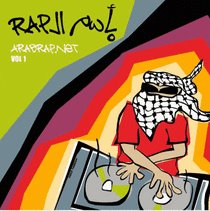
They're young and they're using music instead of rock-throwing to make their voices heard. Here are excerpts from an article published in one of Scotland's independent newspapers.
Making their voices heard
A group of young rappers are using lyric-writing rather than stone-throwing to battle oppression
From Martin Patience in Gaza City
MOHAMMED al-Fara no longer makes an entrance. At the upmarket Marna House hotel in Gaza City, groups of young men sit under the yellow and blue umbrellas in the hotels walled garden quietly chatting. The scented smoke from their water pipes fogged the cool air. In walks Fara, a tall, slender 20-year-old, sporting a neatly-trimmed black beard and teeth whiter than snow. Wearing a navy blue T-shirt and beige jeans, his entrance barely draws a glance.
A year ago it was all very different. As the leader singer and songwriter for Gaza's first rap group, The Palestinian Rappers, Fara used to kit himself out in standard rapper apparel: a sports jumper three sizes too big, baggy trousers, and a chunky silver necklace that dangled down to his belly-button.
"The people here thought we were trying to be American, which we weren't," says Fara. "But I also realised that the rapping isn't about the clothes, it's about the lyrics."
During the start of the second intifada in September 2000, Fara, along with hundreds of other youths, threw stones at Israeli armoured jeeps and tanks close to the Neve Dekalim settlement which abutted the southern Gaza Strip city of Khan Younis. (All 21 Israeli settlements in Gaza were finally evacuated this summer.)
A bullet fired by an Israeli soldier flew over his head. As he turned to run, another bullet hit his left arm.
"I realised that it's not my way to throw rocks," says Fara, who has fully recovered from his injury. "I realised that, by rapping, my message will be heard by other people."
Fara's interest in rap began as a 12-year-old when he bought bootleg cassettes of US stars such as Puff Daddy, Biggie Smalls and Coolio. But it was Tupac Shakur who really caught Fara's attention.
"He was a man who rapped against racism, against the black and white divide, the rich and the poor, and against the government," says the sociology student at the al-Quds Open University in Khan Younis.
"He rapped about important issues, not about bling, cars and girls. People in the world don't think we're suffering. That's why I resorted to rapping to give people the real message."
You can read the full story at the Sunday Herald
Another feature about the group and life in and around the Gaza Strip, which came out early this year (the Sunday Herald piece was published just this month), is at ZuluNationJapan.com
No comments:
Post a Comment